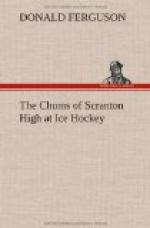After a short time they arrived at the smithy. Deacon Winslow lived close to his shop. He was a big man, with the proverbial muscles of the blacksmith; and for many years he had been looked upon as a pillar in the church he attended.
Besides this he was reckoned a good man, who could always be counted on to go out of his way to do a favor for anybody. The poor of Scranton loved him better than they did anyone they knew. His acts were often “hidden under a bushel,” since he did not go around, as Thad once said, “blowing his own horn, and advertising his goodness as one would soft soap.”
Strange as it might seem, Deacon Winslow had taken quite a fancy to Nick Lang, and possibly he was the only respectable man in all Scranton who did. Perhaps he admired Nick’s muscular build, and believed he would make a fine smith, if the husky boy only took a liking to the vocation of hammer and forge and anvil.
Then again it was likely that the deacon, who was a shrewd old fellow as well as good-natured and honest, saw deeper into that bad boy’s soul than ordinary people, judging from surface indications. Hugh himself was inclined to believe this might be the case.
Be that as it may, Nick had been known to go out there to the Winslow shop occasionally after supper, and work alongside the old man for hours at a time. Folks considered it only another odd fad on the part of the deacon. They prophesied that he would sooner or later he sorry for having anything to do with such a good-for-nothing scapegrace as Nick Lang, who would not hesitate to play some nasty practical joke on his benefactor when the notion seized him and he had grown tired of bothering with blacksmithing.
The deacon himself came to the door. He knew both lads, and asked them to step in and sit with him before his cheery fire, as he had half an hour on his hands before starting to church.
Hugh plunged into the matter without waste of time. He told Deacon Winslow how he had been reading that wonderful story of Jean Valjean; and then what a strange freak of fate allowed him to play the same part that the good priest had done.
Step by step he carried it along, and Deacon Winslow appeared to be deeply interested, if one could judge from the way he rubbed his hands together, and nodded his head approvingly when he learned of the motives that had influenced Hugh to act as he did.
Even what had occurred on the ice on the preceding afternoon was narrated, for, as Hugh explained, he believed it had a great deal to do with the startling event that had stunned Scranton that same Sunday morning.
When he had finally ended with a profession of his belief in Nick’s innocence the old man once more nodded his head. His wise eyes shone with a rare delight as he gazed at Hugh. The boy could not help thinking that the good priest in the story must have been a whole lot like old Deacon Winslow; who could believe wrong of no one, boy or man, but was always finding some excuse for forgiving, even those who deceived him in business transactions.




